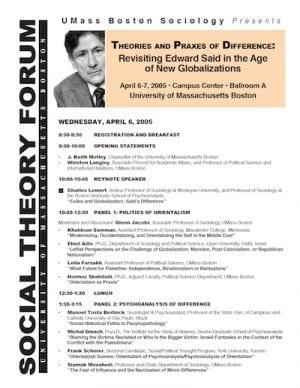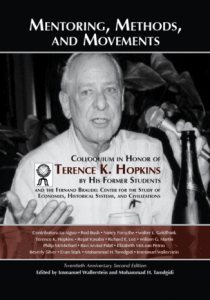Proceedings Journal Article — Occidentalizing and Orientalizing the Self in the Middle East — by Khaldoun Samman
$15.00
In this paper I invert Said’s focus on how the “other” was constructed and made real to the more perplexing issue of how these constructs were received by its referent “other.”
Description
Abstract
In this paper I invert Said’s focus on how the “other” was constructed and made real to the more perplexing issue of how these constructs were received by its referent “other.” That is, how precisely does the “oriental” negotiate the constructs produced by the Orientalist discourse? The irony of this form of analysis is that it demonstrates that as the world becomes more permeated with the transnational flow of goods, culture, and military bases from the West, the people of the periphery look “inward” and create a space for themselves by producing what they believe represents their authentic culture. In this sense the actual dynamics of a given locational identity rely on, and are shaped by, activities and forces that are global. But there are multiple ways the “Oriental” produces his or her identity.
I explore how the Orient produces its self through the binaries constructed by the Western gaze. The example I shall use is that of the Middle East, where the “Arab-Islamic world” reproduced the binaries given to it by the “West” in multiple ways, sometimes complicitly accepting the binaries as objective cultural realities while at other times resisting these same assigned constructs. Islamists and Arab nationalists were satisfied as being “different from the West” while Zionists and Kemalists vigorously refused to accept the Oriental label by removing their imagined identity from the Orient and becoming part of “Western” civilization. The argument presented here is that the identities produced in response to the hegemonic power of the global north have come in largely three forms: Modernizing (Arab Nationalism), Occidentalizing (Zionism and Kemalism), and Orientalizing (Islamist Movements).
Recommended Citation
Samman, Khaldoun. 2005. “Occidentalizing and Orientalizing the Self in the Middle East.” Pp. 29-46 in Theories and Praxes of Difference: Revisiting Edward Said in the Age of New Globalizations: Proceedings of the Second Annual Social Theory Forum, April 6-7, 2005 (Discourse of Sociological Practice, Vol. 7, Issues 1&2, Fall/Spring 2005). Double-Issue Guest Editor: Mohammad H. Tamdgidi. Sociology Department, UMass Boston.
Read the Above Publication Online
You can read the above publication free-access online, by clicking the PDF icon below.







